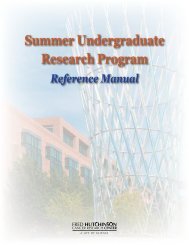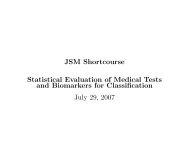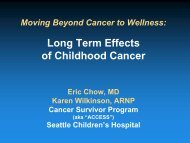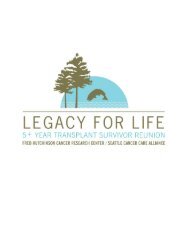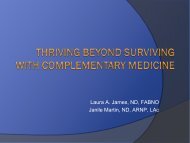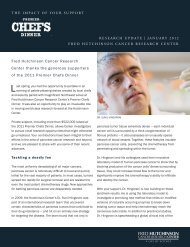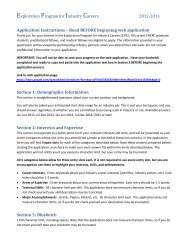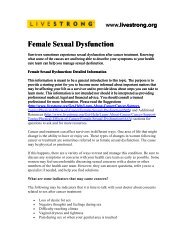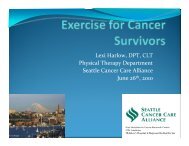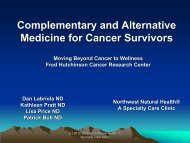Download PDF - Fred Hutchinson Cancer Research Center
Download PDF - Fred Hutchinson Cancer Research Center
Download PDF - Fred Hutchinson Cancer Research Center
You also want an ePaper? Increase the reach of your titles
YUMPU automatically turns print PDFs into web optimized ePapers that Google loves.
THE IMPACT OF YOUR SUPPORT<br />
Hutch Holiday Gala<br />
Basic Sciences<br />
Endowment<br />
At <strong>Fred</strong> <strong>Hutchinson</strong> <strong>Cancer</strong> <strong>Research</strong> <strong>Center</strong>, our<br />
compassion drives us to seek a better future for<br />
those with cancer, HIV/AIDS and related diseases. At the<br />
heart of our research are the dedicated scientists of the<br />
Basic Sciences Division, who are continually pushing the<br />
boundaries to gain a fundamental understanding of how<br />
biology works. This exploration of life’s basic mechanisms is<br />
leading to remarkable discoveries and potentially lifesaving<br />
advances.<br />
Private support is crucial to the scientific foundations upon<br />
which new strategies to fight cancer and other diseases<br />
are built. At the 2011 Hutch Holiday Gala, attendees<br />
demonstrated their commitment to the <strong>Hutchinson</strong> <strong>Center</strong>’s<br />
mission and researchers once again, this time raising more<br />
than $6.2 million for a Basic Sciences Endowment, and<br />
bringing the lifetime Gala total to more than $81.4 million in<br />
the 36-year history of the event.<br />
In this report, we highlight two projects being led by Basic<br />
Sciences Division researchers that would not be possible<br />
without generous partners like you:<br />
• A breakthrough in understanding the evolutionary<br />
conflict between HIV-related viruses and their hosts’<br />
defense systems<br />
RESEARCH UPDATE | AUGUST 2012<br />
FRED HUTCHINSON CANCER RESEARCH CENTER<br />
DRS. MICHAEL EMERMAN AND HARMIT MALIK<br />
• A discovery into protein structure that is paving the way<br />
for corrective gene therapy that could cure multiple<br />
diseases<br />
Thank you for helping to fund projects such as these and<br />
joining the <strong>Hutchinson</strong> <strong>Center</strong> in its goal to improve the lives<br />
of those who battle cancer and related diseases.<br />
Evolutionary genetic arms race<br />
<strong>Hutchinson</strong> <strong>Center</strong> scientist Dr. Harmit Malik and his<br />
colleagues study the genetic tugs-of-war between viruses<br />
and their hosts, epic battles in which each side rapidly<br />
evolves to gain the upper hand over its opponent. A<br />
world leader in his field, Dr. Malik explores the history of<br />
these conflicts in order to improve our future chances of<br />
successfully treating deadly infections such as HIV.
THE IMPACT OF YOUR SUPPORT<br />
Recently, Dr. Malik and an interdisciplinary team of<br />
<strong>Hutchinson</strong> <strong>Center</strong> investigators traced, for the first time<br />
ever, the origin of one such evolutionary struggle. It pits two<br />
proteins against each other: a host protein that helps cells<br />
resist infection by HIV-related viruses and a protein made<br />
by some members of the HIV family that can degrade that<br />
defensive host protein. By piecing together a family tree of<br />
sorts for the viral protein, the researchers found that the<br />
most common form of the human virus, known as HIV-1, is<br />
part of a branch that never acquired the ability to counteract<br />
this host defense mechanism.<br />
If HIV-1 can’t break down the protective protein, then why,<br />
you may ask, is it so successful at infecting human cells?<br />
One possibility is that this supposed weakness in the virus<br />
has actually made it stronger, driving it to compensate by<br />
developing even more effective countermeasures. More<br />
research will need to be done before we know for sure, but<br />
already discoveries like Dr. Malik’s are giving scientists<br />
the answers they will need to design better vaccines and<br />
therapies to prevent and treat HIV infection.<br />
Paving the way for corrective therapy<br />
Dr. Barry Stoddard and colleagues have solved the threedimensional<br />
structure of a recently discovered type of<br />
gene-targeting protein called a TAL effector. These proteins<br />
have the potential to be extremely powerful tools for gene<br />
therapy and gene correction, offering the possibility of better<br />
treatments, and even cures, for disease.<br />
TAL effectors occur naturally in a type of bacteria that can<br />
infect certain plants, but, as Dr. Stoddard explains, “In<br />
biotechnology and medicine, TAL effectors can be used<br />
by scientists to seek out and bind to DNA targets in any<br />
organism of choice, including genes in humans that contain<br />
disease-causing mutations that we might want to correct.”<br />
Using sophisticated computational analyses and X-ray<br />
technology to study the arrangement of the protein’s<br />
Kristin Nash, Manager, Hutch Holiday Gala<br />
Tel. 206.667.6252 knash@fhcrc.org<br />
Mail Stop J5-200, PO Box 19024, Seattle, WA 98109<br />
DR. BARRY STODDARD<br />
individual atoms, the group determined that TAL effectors<br />
have a modular, LEGO-like architecture that allows them to<br />
be easily reshuffled and engineered for DNA targeting.<br />
Solving the structure of the TAL effector protein allows<br />
scientists to see exactly how the protein binds to its DNA<br />
target. With the form finally unveiled, scientists can now<br />
engineer the proteins to work more effectively in a variety of<br />
medical applications.<br />
Thank you<br />
The <strong>Hutchinson</strong> <strong>Center</strong> thanks you again for your support.<br />
Your generous contributions help to sustain our scientists in<br />
their unwavering commitment to improve the lives of those<br />
with cancer and related diseases.<br />
» Save the date<br />
37 th Annual Hutch Holiday Gala<br />
Saturday, December 1, 2012<br />
www.fhcrc.org/gala




